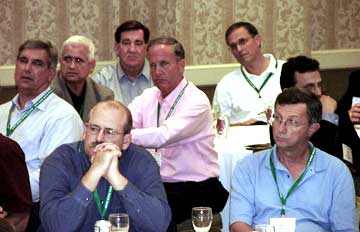
Productivity Essentials:
Trust, Talk and Savvy Outsourcing
Trust, Talk and Savvy Outsourcing
Produce or perish: That simple and unforgiving imperative drives business.
But how does corporate real estate (CRE) add optimal productivity? That was the meaty topic a group of IAMC Corpus Christi attendees chewed over at one of the Professional Forum's popular peer-to-peer sessions.
The peer-to-peer session first broke into two groups: CRE executives in one, service providers and economic development professionals (EDs) in the other. After the two contingents met separately, they gathered together to discuss CRE and productivity.
High-Value Service Providers
"I think that a lot of us chose this session because we think that we probably need to
 |
The CRE group initially focused on Alcoa, where a one-person CRE staff, Jim Winter, Jr., outsources in jumbo portions. On average, Winter said, Alcoa annually leases, sells or buys between 25 million to 35 million sq. ft. (2.3 million to 3.3 million sq. m.) of space and does between 60 and 150 transactions a year.
"It's a huge deal stream," said Winter. "We found that the value that [service providers] could bring was better than what we could have done in-house." Alcoa's service providers work directly with the 26 business units; Winter only gets involved in transactions that "are of a high value." For all transaction-related items, providers work with standard provisions; if a project seems headed outside those provisions, legal gets involved.
Alcoa's outsourced model allows the company "to staff up or down quickly and cost-effectively, depending on our needs. And all of our systems are Web-based. That enables me to concentrate more on adding value through portfolio management. It's a seamless process that works very well."
Alcoa is now getting ready to implement the outsourced CRE model worldwide. That will roughly double the portfolio that Winter manages.
A Matter of Trust
Trust — a recurrent theme of the Forum as a whole — also was a recurrent thread in how CRE can best work with service providers. Sometimes, the two groups' aims don't synch up.
Executives from service provider The Fischer Co. (which handles Alcoa's transactions) described how their company handles conflicts. "We start with customers' planning, goals and objectives up front in the process," explained Ted Uzelac. "That way it's easier to know what [CRE] wants us to do. We have to have trust in the relationship."
Fischer has a policy for dealing with actual and potential conflicts. "Sometimes, we might find an existing building that's less expensive," said Uzelac, "but that might not be CRE's standard preference. So in cases like that, we call the CRE executive and say, 'Tell us what to do.' "
What's the Best Way to Pay?
The group didn't agree on a clear solution (e.g., fee-based versus commission-based) for most efficiently structuring provider agreements.
Most participants did agree, though, that speedy exit options help protect a CRE arm. Fischer Co., for example, provides a standard 30-day "out clause" for both contract parties. The company, Uzelac explained, also "goes back to the corporation for comment on every transaction's communication, scheduling and courtesy. We might find, for example, that three of our five people working one corporate account are doing very good jobs, while the two others aren't."
Getting corporate input "also reveals that sometimes you just have conflicting personalities."
The issue of whether service providers' work is equal to what a CRE executive could do arose in the CRE-only session. Uzelac allowed that sometimes a landlord, for example, is more willing to give when he's talking to a CRE executive; his presence tells the landlord that the negotiation is nearing a make-or-break point. In cases like that, Fischer "will get Jim [Winter] on the phone with us and with the landlord."
How do CRE executives prefer communicating? The BOC Group's Pete Garra was among the large group preferring face-to-face contact. "You need the ability to ask questions, and you can get a lot of information from a voice inflection," he said.
Follow-through is also critical to trust, one CRE executive said. "[Providers] need to schedule times for performance reports," he emphasized. "And if they say those reports will be delivered every Monday, then the reports need to be there every Monday."
Finding the Right Level
Group opinions varied widely as to the level (e.g., state, local) at which CRE units should start a location project.
Some state EDs contended that their arms have the broadest and best information. Some regional EDs contended that many searches by then have already narrowed to a general region; ergo, regional arms are the better option.
Some regional EDs noted that their service territories include several states, giving them greater objectivity. Local area EDs also got some vocal support: "A local area may have 'above and beyond' incentives that it's prepared to offer that the state and regional EDs don't know about," one local ED contended.
CSX's Charles McSwain pointed out that CRE arms should look at ED groups as more than simply a source of potential site information.
"We (CSX) had an empty data center that we were trying to dispose of, but we weren't having any luck," he said. But then McSwain added the project to PECO Energy's online listings and voila, the data center was disposed of in short order.
- Jack Lyne
